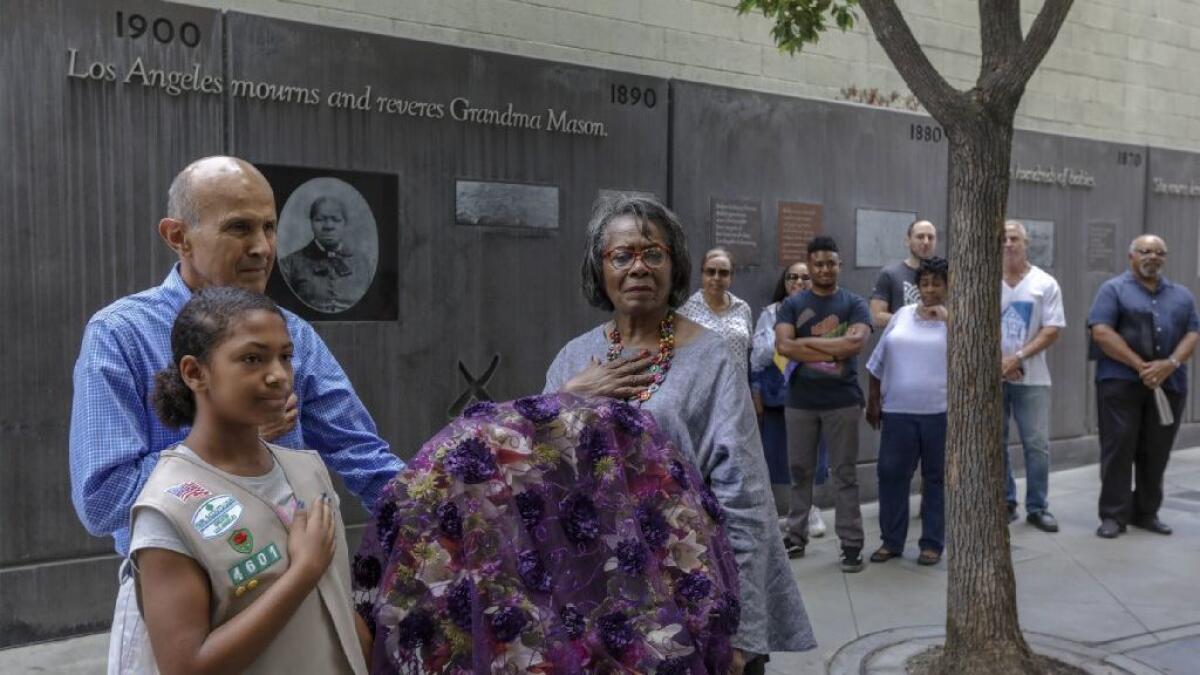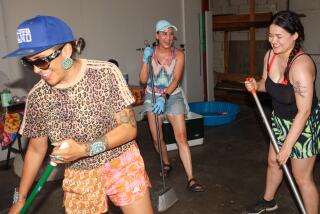Honoring the legacy and 200th birthday of slave-turned-entrepreneur Biddy Mason

Cheryl Cox remembers as a child standing in front of the wall honoring her great-great-great-great-grandmother Biddy Mason, a former slave who became a wealthy landowner, a noted philanthropist and a key founder of the first African American Church in Los Angeles.
On Saturday morning, Alicia Randall, an Altadena Girl Scout, stood in almost the same spot that Cox did to help place a purple wreath next to the wall to mark Mason’s bicentennial birthday celebration.
Several dozen people attended Saturday’s event at Biddy Mason Memorial Park at 311 Spring St., the site of her former home. It was organized by the Biddy Mason Charitable Foundation and Truth, Racial Healing & Transformation of Los Angeles.
Often, pedestrians walk past the downtown park without reading the history of its famous namesake. On Saturday, people stopped to partake in the celebration and to learn more about Mason.
Cox, her sister Robynn Cox, and Robynn’s two children Daniel and Dakota are the last living descendants of Mason, whose philanthropy included building an orphanage, a school and co-founding the First African Methodist Episcopal Church of Los Angeles.
“It’s always good to see that people are still honoring and supporting her legacy,” said Cox, who co-founded the Biddy Mason Foundation with her mother, Linda Spikes Brown. Their organization is not affiliated with the Biddy Mason Charitable Foundation.
The park also includes an 81-foot long concrete wall with a timeline detailing Mason’s history in Los Angeles, a collage reminiscent of Mason’s original wood-frame home by sculptor and assemblage artist Betye Saar and a fountain.
“There is power in remembering who our predecessors are and keeping their memory alive,” said Sonny Abegaze, director of Truth, Racial Healing & Transformation Los Angeles. “Biddy Mason was a philanthropist before that was a concept. That strength is something we can pull from and rely on.”
“It is our pleasure to be here, and it is our responsibility as well,” added Jackie Broxton, vice president of the Biddy Mason Charitable Foundation’s board of directors. “A squeaky wheel gets all the noise. We need to make people aware of her legacy.”
The Biddy Mason Charitable Foundation continues her legacy by dedicating itself to the care of foster youth. The nonprofit organization provides clothing, toiletries, food and other supplies for foster children.
The organization was inspired by the orphanage Mason opened on property she owned. Because of Mason’s philanthropic work, Broxton feels it is her duty to stay connected with her history.
“As an African American, we can only go back so far in our ancestry. I don’t think others understand how disconnected we are from knowing where we’re from,” Broxton said.
Broxton and other members of the charitable foundation handed out posters and cards with the history about Mason’s life.
Bridget “Biddy” Mason was born into slavery on Aug. 15, 1818, in Hancock County, Ga. She was sold multiple times, eventually landing in Mississippi on the plantation of Robert and Rebecca Smith in 1836.
After Robert Smith joined the Church of Jesus Christ of Latter-day Saints in the 1840s, he moved his family and 14 slaves from Mississippi to Salt Lake City, then to San Bernardino to join a larger Mormon settlement.
Unbeknown to Smith, California was a free state. Smith hid his slaves and family until law enforcement captured them. Mason and the other slaves were put in jail under protective custody.
She was eventually taken to see Judge Benjamin Hayes in his private chambers where she told him about their travels to California and Smith’s refusal to set them free. In January 1856, Smith testified that Mason and the other slaves were only traveling companions. The day after Smith testified, Hayes granted Mason her freedom.
With her freedom, Mason became a nurse and midwife, using the skills she learned as a slave. Some patients gave her land in payment for delivering their children. She also saved her money and invested in downtown real estate, including buying the property at 311 Spring St. that would become her home.
The Spring Street property was also where Mason and others established the First AME Church, the oldest African American church in the city. The initial meetings were held in Mason’s home.
It’s Mason’s drive and achievements that make her worth remembering centuries later.
“More people in Los Angeles should know her story,” Abegaze said.
“Biddy Mason and her life is a story of inspiration,” Broxton said. “For her to overcome the obstacles in her path is almost unbelievable.”
michael.livingston@latimes.com
More to Read
Sign up for Essential California
The most important California stories and recommendations in your inbox every morning.
You may occasionally receive promotional content from the Los Angeles Times.










